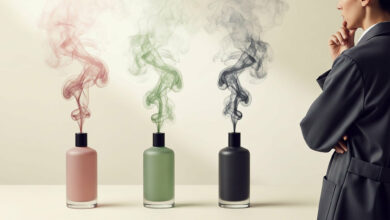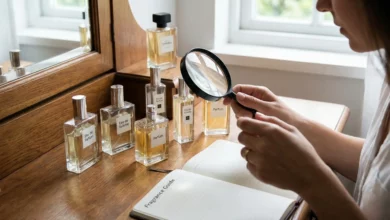Long Lasting Hair Mists: Top 3 Picks for All-Day Scent (2025)
Table of contents
The Alluring Promise of a Lasting Scent Cloud
There’s a special kind of magic in a hair mist. It’s a lighter, more ethereal way to wear fragrance, creating a beautiful scent cloud—or ‘sillage’—that trails behind you as you move. It’s the secret to smelling incredible in a way that feels effortless and integrated, as if the beautiful scent is a natural part of you.
But there’s a frustrating, well-known problem: most hair mists seem to vanish into thin air within an hour. Finding one with real longevity can feel like searching for a unicorn.
We’re diving into what makes a hair mist last and ranking three of the most popular and impressively long-wearing formulas on the market. This is your guide to finding a hair perfume that actually sticks around.
The Science: Why Hair is a Great (But Tricky) Fragrance Carrier
Your hair strands, with all their surface area, are like a natural, personal diffuser. The challenge is that hair mists, by design, have a lower concentration of perfume oils and are often formulated with less alcohol than an Eau de Toilette to be gentler on your hair. This is why they are often so light and can fade quickly. The best-performing mists use specific formulation technologies—like nourishing oils or silicones—that help the fragrance molecules cling to the hair shaft for longer, which is directly related to the hair’s pH level and cuticle sealing.
The Sylvaia Ranking: Our Top 3 Long-Lasting Hair Mists
We tested a range of hair perfumes to find the ones that delivered both a beautiful scent and impressive staying power. These three were the clear winners.
#1 The Niche Powerhouse: Byredo Hair Perfume
- The Vibe: The ultimate “cool girl” luxury scent for your hair.
- Why We Love It: Byredo’s hair perfumes are legendary because they smell remarkably true to their iconic Eau de Parfums (like the famous Gypsy Water or Mojave Ghost). The formula is a light, silicone-based mist that adds a beautiful hair shine without drying out the hair. But the real star is the longevity; it genuinely lasts for hours, leaving a soft but noticeable and captivating trail that is never overpowering.
- Best For: The fragrance connoisseur who wants their hair to smell exactly like their favorite niche scent, with impressive, best-in-class staying power.
#2 The Timeless Designer Aura: Dior J’adore Hair Mist
- The Vibe: Elegant, radiant, and classically sophisticated.
- Why We Love It: This is pure luxury in a bottle. It captures the iconic bright floral bouquet of J’adore in a format that feels enriching and nourishing for the hair. The scent lingers beautifully for several hours, creating a truly elegant aura. It works exceptionally well when layered with the matching body lotion to create a full, long-lasting scent experience.
- Best For: Fans of classic designer fragrances who want to create a complete, sophisticated scent bubble that has noticeable longevity.
#3 The Unbeatable Gourmand: Sol de Janeiro Cheirosa ’62 Hair & Body Mist
- The Vibe: A warm, addictive, sun-drenched beach vacation in a bottle.
- Why We Love It: While technically a hair and body mist, the performance of this product is absolutely legendary, outperforming many high-end perfumes. The warm, gourmand scent of pistachio, salted caramel, and vanilla clings to hair like nothing else, lasting for an incredible 8+ hours. For its price, the performance is undeniable.
- Best For: Anyone who loves a warm, sweet, gourmand scent and wants the absolute best bang-for-your-buck in terms of longevity.
Pro-Tips for Making Your Hair Mist Last Even Longer
- Tip 1: Spray Your Hairbrush For a more even and delicate distribution, lightly spray the mist onto your hairbrush and then brush it through the mid-lengths and ends of your hair.
- Tip 2: Layer on Hydrated Hair Applying your hair mist after you’ve used a leave-in conditioner (on damp hair) or a styling cream can give the fragrance molecules a moisturized base to cling to, which can help extend their life.
- Tip 3: Scent the “Underlayer” Lift the top section of your hair and spritz the mist onto the hair underneath. As you move throughout the day, the top layer will lift, releasing fresh puffs of fragrance.
The Verdict: A Lighter Path to a Lasting Impression
Finding a hair mist with impressive longevity is no longer an impossible task. Modern formulas from both niche and accessible brands are proving that you can have a light, hair-friendly application without sacrificing performance.
Whether you opt for a luxury niche scent, a classic designer aura, or an affordable gourmand powerhouse, these long-lasting mists are the perfect way to create a beautiful, lasting sillage that feels effortlessly and uniquely you.
Related article:





